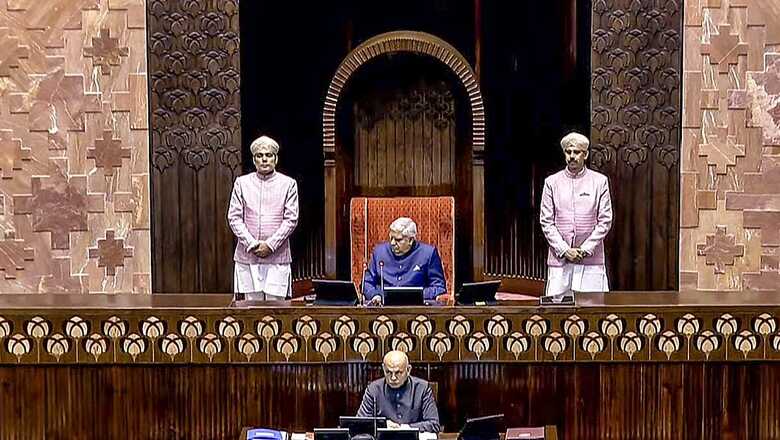
views
A part of the Narendra Modi government’s showpiece reforms and a crucial step forward in the process of ‘decolonisation’, the proposed criminal codes — Bharatiya Nyaya Sanhita (BNS), Bharatiya Nagarik Suraksha Sanhita (BNSS) and Bharatiya Sakshya Bill (BSB) — could be passed in the upcoming Winter Session of Parliament or in the 2024 Budget Session.
However, the codes are likely to be notified and implemented only after the 2024 Lok Sabha elections, if the BJP-led National Democratic Alliance is voted back to power, a top government source told News18.
The Bharatiya Nyaya Sanhita (BNS) Bill, 2023 will replace the Indian Penal Code (IPC); Bharatiya Nagarik Suraksha Sanhita (BNSS) Bill, 2023 will replace the CrPC; and Bharatiya Sakshya (BS) Bill, 2023 will replace the Indian Evidence Act.
The three bills were tabled in Parliament on August 11 and were sent to the Select Committee, which placed its report along with its recommendations before the Chairman of the Rajya Sabha a fortnight ago.
The main challenge, senior serving officers in central agencies feel, would be dealing with the transition period as the new criminal code would prompt a colossal shift in the criminal justice system.
“As the new code comes into effect, only fresh cases will be charged under the new sections of BNS, and not IPC. However, the thousands of cases related to thousands of offences across the states and central agencies would continue to be tried under the old sections of IPC. There will not be any retrospective effect on old cases,” said a senior IPS officer serving in a central government agency.
However, in their dissent notes, MPs from opposition parties have called the proposed codes a rearrangement of the earlier ones and a “stunt”. Speculating that the Modi government may pass the bill this Winter Session, senior politicians have objected to the proposed development.
What the Opposition Says
Pointing out that the current Lok Sabha is close to the end of its term, West Bengal Chief Minister and TMC supremo Mamata Banerjee wrote to Union Home Minister Amit Shah that the government and MPs elected in 2024 general elections must deliberate upon “these extremely important legislations and take a considered view”.
“I strongly believe that these are very significant legislations that form the bedrock of our penal-criminal jurisprudence. As such, the proposed overhauling of the existing criminal-penal statutes and replacing them with new statutes, is bound to have far-reaching long-term implications on our polity. The suggested changes will also affect the public life of India in multiple ways. Therefore, in my view, extreme caution and due diligence should precede any change in the existing statutes,” she wrote in the letter dated November 29.
“This can only be achieved through wide-ranging consultations and discussions with all stakeholders before Parliament legislates on such issues. In my considered opinion, before we embark on any such exercise which permanently changes the criminal-penal landscape of the country, detailed views of all sections of stakeholders (e.g., jurists, public activists, human rights workers, general public etc.) must be taken in order to create consensually accepted platform. Failure on our part may have very adverse implications on our polity,” she added.
Administrative Challenges
Months before the implementation of the new codes, the government will start systematic training for the police officers and similar training will also be held for the judiciary. “The government and the apex court will ensure that all new codes percolate to the primary level of the criminal justice system. It has to reach every police station and every session and district court,” a senior officer said.
According to senior police officers, there will be situations in which an investigating officer (IO) will have to deal with a murder case under Section 302 of the IPC and another case charged under Section 302 of the BNS for the offence of stealing. The BNS and IPC have several overlapping sections for different offences.
“Manoeuvring through old and new codes will be complicated and it will take years to settle down with the new code. However, it was the need of the hour. The system was old and colonial. With several amendments and changes, the criminal code became pro-accused too. An overhaul was needed,” said the officer.
Another senior IPS officer explained that many countries undertook an in-depth reform to bring their criminal justice system in line with the international standards. “Criminal justice system and the criminals are the central elements of any national system of protecting the rule of law. Over the years, our legal framework and criminal codes have faced new types of challenges: greater complexity of cases due to societal changes, the development of new technologies and the internationalisation of crime. We needed a fresh system to deal with new challenges,” he added, saying countries like Turkey, Ukraine and others have overhauled their old systems.



















Comments
0 comment